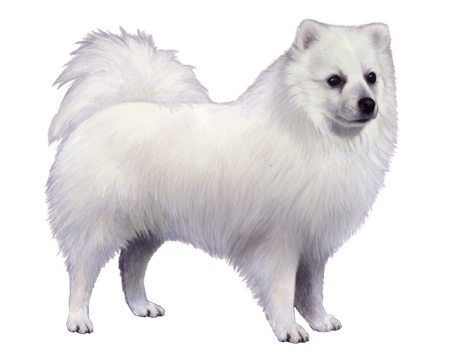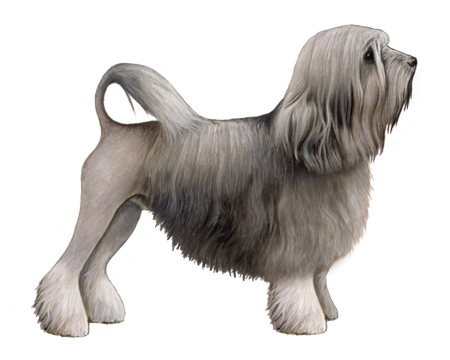
Swedish Lapphund
The Swedish Lapphund is a friendly, energetic, alert breed. These affectionate pups love to spend time with their humans and make excellent pets for active families.
Interested in discovering if your dog is a Swedish Lapphund?
Check out Wisdom Panel's DNA tests.

Swedish Lapphund Traits
General Appearance
The Swedish Lapphund is a slightly less than medium-sized, spitz-type dog with a water-repellent coat.
Coat and Colouring
The Lappie has a thick, medium-length double coat. The hair on the outer coat stands straight off the body, and the undercoat is dense and finely curled. The breed also has a ruff around the neck and longer hair on the brisket and backside of the legs. These dogs' coats are typically solid black. But some bronzing of the coat is common. Lappies may also have white on their chests, feet, and tip of their tail.
Distinctive Physical Traits
This breed has relatively large, round eyes and triangular prick ears with slightly rounded tips. Lappies also have strong, muscular backs and bushy tails that they carry over their backs when moving.
Swedish Lapphund Temperament
Kind, affectionate dogs, Lappies have a playful, lively personality and love to be included in family activities. Though they need daily outlets for their energy, they're also more than happy to curl up with their people when it's time to relax.
Swedish Lapphunds worked as herding and guard dogs for centuries, and the qualities that made them successful in those jobs remain. That means they're alert and always willing to work. It also means they tend to bark if they want to get your attention.

Swedish Lapphund History
Originating in the North Arctic Circle, the Swedish Lapphund is one of the world's oldest dog breeds. It's also one of three Lapphund breeds developed by the Sami people to hunt (and later guard and herd) reindeer.
As demand for these dogs' reindeer skills dwindled, Lappies largely transitioned from working dogs to faithful companions—a role they performed equally well. Still, their numbers began to decline. And in the mid-20th century, the breed faced extinction. Several breeders stepped up to save the Swedish Lapphund, but it remains a rare breed today.
The United Kennel Club recognized the Swedish Lapphund in 2006. The following year, the American Kennel Club added the breed to the Foundation Stock Service program.
Swedish Lapphund Care
Nutrition
The Swedish Lapphund thrives on a high-quality diet formulated for their life stage. To keep your dog at a healthy weight, measure their portions to avoid overfeeding and keep an eye on how many treats you're giving them. As a guideline, treats should make up no more than 10% of a pup's daily calories.
Grooming
For most of the year, weekly brushing is enough to maintain a Lappie's coat. But once or twice a year, these dogs blow their coats. And the amount of fur they shed is excessive, to say the least. Brushing more frequently during these periods will help keep loose fur under control. Also, keep in mind that you should never shave the Lapphund's coat—it must be kept at its natural length year-round.
Regular ear cleanings and nail trims should also be part of every dog's grooming routine. And don't forget about dental care. Dental disease is one of the most common health conditions in adult dogs. Left untreated, it can contribute to other serious issues. In addition to professional cleanings, establish an at-home dental care program that includes regular teeth brushing and veterinarian-recommended dental chews.
Exercise
An energetic breed, the Swedish Lapphund needs daily exercise to stay happy and healthy. These pups enjoy brisk walks, hikes, and chasing around the backyard. They're also well-suited for tracking, agility, canine musical freestyle, and other dog sports.
Training
Lappies are intelligent, eager-to-please dogs. But they do have a stubborn streak. Be patient when teaching new commands, and use a gentle, reward-based approach to make training more fun for everyone.
Additionally, all dogs benefit from early socialization. Introducing your pup to different people and environments when they're young will help them develop into a predictable, well-mannered adult dog.
Breed Group
Companion
This group consists of dogs typically bred for the specific purpose of human companionship, and many are popular pets because of their gentle nature. They became more common as the concept and luxury of dogs as pets prevailed.
Resources
https://www.ukcdogs.com/swedish-lapphund
https://www.akc.org/dog-breeds/swedish-lapphund/
Reviewed 16 June 2021 by Jamie Freyer, DVM



























_Color.png)










